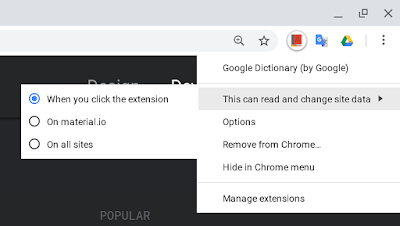
[Cross-posted from the Chromium blog]
Incredibly, it’s been nearly a decade since we launched the Chrome extensions system. Thanks to the hard work and innovation of our developer community, there are now more than 180,000 extensions in the Chrome Web Store, and nearly half of Chrome desktop users actively use extensions to customize Chrome and their experience on the web.
The extensions team’s dual mission is to help users tailor Chrome’s functionality to their individual needs and interests, and to empower developers to build rich and useful extensions. But, first and foremost, it’s crucial that users be able to trust the extensions they install are safe, privacy-preserving, and performant. Users should always have full transparency about the scope of their extensions’ capabilities and data access.
We’ve recently taken a number of steps toward improved extension security with the launch of out-of-process iframes, the removal of inline installation, and significant advancements in our ability to detect and block malicious extensions using machine learning. Looking ahead, there are more fundamental changes needed so that all Chrome extensions are trustworthy by default.
Today we’re announcing some upcoming changes and plans for the future:
User controls for host permissions
Beginning in Chrome 70, users will have the choice to restrict extension host access to a custom list of sites, or to configure extensions to require a click to gain access to the current page.
While host permissions have enabled thousands of powerful and creative extension use cases, they have also led to a broad range of misuse – both malicious and unintentional – because they allow extensions to automatically read and change data on websites. Our aim is to improve user transparency and control over when extensions are able to access site data. In subsequent milestones, we’ll continue to optimize the user experience toward this goal while improving usability. If your extension requests host permissions, we encourage you to review our transition guide and begin testing as soon as possible.
Changes to the extensions review process
Going forward, extensions that request powerful permissions will be subject to additional compliance review. We’re also looking very closely at extensions that use remotely hosted code, with ongoing monitoring. Your extension’s permissions should be as narrowly-scoped as possible, and all your code should be included directly in the extension package, to minimize review time.
New code reliability requirements
Starting today, Chrome Web Store will no longer allow extensions with obfuscated code. This includes code within the extension package as well as any external code or resource fetched from the web. This policy applies immediately to all new extension submissions. Existing extensions with obfuscated code can continue to submit updates over the next 90 days, but will be removed from the Chrome Web Store in early January if not compliant.
Today over 70% of malicious and policy violating extensions that we block from Chrome Web Store contain obfuscated code. At the same time, because obfuscation is mainly used to conceal code functionality, it adds a great deal of complexity to our review process. This is no longer acceptable given the aforementioned review process changes.
Additionally, since JavaScript code is always running locally on the user’s machine, obfuscation is insufficient to protect proprietary code from a truly motivated reverse engineer. Obfuscation techniques also come with hefty performance costs such as slower execution and increased file and memory footprints.
Ordinary minification, on the other hand, typically speeds up code execution as it reduces code size, and is much more straightforward to review. Thus, minification will still be allowed, including the following techniques:
- Removal of whitespace, newlines, code comments, and block delimiters
- Shortening of variable and function names
- Collapsing the number of JavaScript files
- More narrowly-scoped and declarative APIs, to decrease the need for overly-broad access and enable more performant implementation by the browser, while preserving important functionality
- Additional, easier mechanisms for users to control the permissions granted to extensions
- Modernizing to align with new web capabilities, such as supporting Service Workers as a new type of background process
We intend to make the transition to manifest v3 as smooth as possible and we’re thinking carefully about the rollout plan. We’ll be in touch soon with more specific details.
